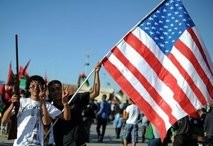Libya's regime had its back to the wall as it faced NATO air strikes, the apparent defection of its oil minister and threats of prosecution by the International Criminal Court.
Rebels fighting to topple Moamer Kadhafi's regime by contrast were growing in confidence and laid claim to being able to represent Libya at the June 8 meeting of oil cartel OPEC in Vienna.
"We want to attend, and will study the legal procedure," Mahmud Shammam, media spokesman for the rebel National Transitional Council (NTC), told AFP in Dubai Wednesday.
"We still do not know if OPEC will invite us," he said.
Libya is a key crude-exporting nation but its output has been slashed since the revolt erupted in mid-February.

Oil Minister Shukri Ghanem, a veteran of Kadhafi's regime, at the weekend crossed from Libya into neighbouring Tunisia, a Tunisian official said, although there has been no confirmation he has defected.
Ghanem, also chairman of Libya's national oil company, had been due to attend the Vienna meeting of the Organization of the Petroleum Exporting Countries but has made no comment since he left Libya and his whereabouts are unclear.
Shammam said he believed the minister was already in the Austrian capital. "We have got confirmation from several sources that Shukri Ghanem is in his house in Vienna," he said.
If confirmed, Ghanem would be among the most senior officials to abandon Kadhafi's government since the revolt erupted.
Thousands of people have died in violent clashes between regime opponents and Kadhafi loyalists, and some 750,000 have been forced to flee, according to data from the International Criminal Court and the United Nations.
UN Secretary General Ban Ki-moon told AFP in an interview Wednesday that Arab leaders faced by uprisings this year have always come out with too little, too late.
He said the goal was for an immediate ceasefire in Libya, and that his special envoy to the country Abdul Illah al-Khatib has been "working very hard" but had no progress to report from efforts to sway Kadhafi.
"In view of the deteriorating humanitarian situation, the crisis is getting worse," Ban said, adding he was very concerned about Misrata, under siege from Kadhafi forces for more than two months and where hundreds have been killed.
In other developments, Libya freed four arrested journalists -- two Americans, a Briton and a Spaniard -- an AFP journalist witnessed as they arrived at the capital's Rixos Hotel on Wednesday.
American James Foley of GlobalPost, an online news agency, and freelance writer Clare Morgana Gillis, as well as Spanish photographer Manu Brabo disappeared on April 4 while covering the conflict. They were freed along with Briton Nigel Chandler.
The Spanish foreign ministry said it "welcomes" the release of Brabo. Britain's foreign office confirmed Chandler's release and said it was providing consular support.
Meanwhile, the International Criminal Court's prosecutor warned the Libyan regime it could face investigation and prosecution if it tried to cover up crimes committed against its people.
The ICC prosecutor's office sent a letter to Libyan Foreign Minister Abdelati Laabidi.
"The office calls upon you and other Libyan authorities to refrain from being involved in such cover up. Failure to do so will result in investigation and prosecution," said the letter, shown to AFP.
ICC chief prosecutor Luis Moreno-Ocampo has asked the court's judges to issue arrest warrants against Kadhafi, his second-oldest son Seif al-Islam and his brother-in-law Abdullah al-Senussi -- for crimes against humanity.
Asked how crimes were covered up, Moreno-Ocampo said: "Even Mr Kadhafi himself said 'where's the bodies?', because what they do is that their doctors are prohibited to register dead people in hospitals... the bodies are hidden."
Libya's government spokesman Mussa Ibrahim has dismissed the ICC's bid, saying the court has no jurisdiction over Tripoli while denying accusations the regime ordered the killing of civilians or hired mercenaries against them.
Libya has been targeted almost daily by NATO-led strikes that began on March 19 after a UN resolution mandated a no-fly zone and called for the protection of civilians from Kadhafi's regime following an order for his forces to crush the revolt.
NATO in its latest operation update released on Wednesday said air strikes in the Tripoli area had hit two tanks, two armoured vehicles, two surface-to-air missile launchers and two radar systems.
























